BMW 3 Series Review 2025
BMW 3 Series At A Glance
Insurance Groups are between 24–42
On average it achieves 137% of the official MPG figure
The BMW 3 Series isn't quite the fashion statement it once was. Traditional 3 Series buyers (most of them company car drivers) are now looking at electric alternatives like the Polestar 2 or Tesla Model 3, while those with families tend to favour SUVs like the Volkswagen Tiguan.
We still like the BMW 3 Series, though. In fact, we reckon the recently updated model is one of the best all-rounders you can buy.
For a start, there's an engine to suit almost every buyer. You could, until recently, get the 3 Series with a slightly underwhelming 2.0-litre petrol or diesel engine in the form of 318i and 318d models. These were fine, but lacked the punch most BMW buyers are after. The now-entry-level BMW 320i and 320d models are much better suited to the 3 Series - combining impressive performance with impressive refinement and relatively low running costs.
While there isn't an electric 3 Series on sale (take a look at the BMW i4 if that's what you're after), you can buy one with plug-in hybrid power. The BMW 330e combines a 2.0-litre petrol engine with an electric motor, providing an electric range of up to 38 miles. That doesn't sound like a huge amount but it's pretty good as far as PHEVs go... you should be able to cover a short commute or school run without the petrol engine kicking in at all.
In the market for a BMW 3 Series that feels a bit more special? The six-cylinder BMW M340i and M340d tick that box very nicely indeed - both are capable of accelerating to 62mph in less than 5.0 seconds (and sound pretty good at the same time... yes, even the diesel).
Whichever engine you go for, the BMW 3 Series is one of the best handling saloon cars on the market. The steering is direct and communicative, while the rear-drive layout means it feels ultra agile - even at town speeds. You can buy the BMW 3 Series with xDrive all-wheel drive (it's standard on the sportier models), while all now come with an excellent smooth-shifting eight-speed automatic gearbox.
Not that the BMW 3 Series is a one-trick pony. As well as being excellent to drive, it also has a classy and comfortable interior and generous levels of equipment (even on the most affordable models). If you're keen to get the latest infotainment, you'll need to look for a post-facelift model from late 2022 onwards.
Although cosmetic changes are minimal, the updated BMW 3 Series now has the same curved dual-screen infotainment display as the BMW iX and i4. As well as looking the part, it remains as user-friendly as ever - with actual physical buttons for adjusting the climate control, as well as BMW's brilliant rotary iDrive controller on the centre console.
Of course, being a traditional three-box saloon, the BMW 3 Series isn't as practical as alternatives from other segments. Its 480-litre boot is no smaller than rivals but, if you've got children, you might want to look at the BMW 3 Series Touring instead. Or, even better, look at the Skoda Superb - a bigger, more practical and more affordable alternative to the BMW 3 Series.
BMW 3 Series handling and engines
- Engines range from 318d MHEV Automatic to 340i
- Readers report Real MPG to be between 26–62 mpg
BMW 3 Series 2025: Handling and ride quality
In a world of SUVs and autonomous driving assistance features, it's rare to find a new car that's as enjoyable to drive as the BMW 3 Series. The steering is pretty much spot on, with sharp responses and plenty of communication, while the rear-wheel-drive layout adds to the overall feeling of agility.
Should you want more traction, xDrive all-wheel drive is available as an option (or fitted as standard to more powerful models in the range). This does little to dampen the fun as it's predominantly rear-biased, anyway, but can shuffle power between the axles to increase grip levels when required - ideal in cold or slippery conditions.
The BMW 3 Series generally rides well, although models fitted with big alloy wheels and M Sport suspension will feel a bit harsher than the standard setup.
BMW 3 Series 2025: Engines
The cheapest BMW 3 Series models were initially powered by a 156PS 2.0-litre petrol (badged the BMW 318i) or a 150PS 2.0-litre diesel (badged the 318d). Although capable of shifting the BMW 3 Series, these lacked sparkle and as such, we'd only really recommend them if you're on a budget.
At the very least, we'd look for a (now entry-level) 320i petrol (which uses the same engine with power boosted to 184PS) or 320d diesel (with 190PS and mild-hybrid technology). Both of these feel pretty punchy, accelerating to 62mph in sub-8.0 seconds - respectable performance for an executive car with a BMW badge.
Old school BMW fans will associate the 330i badge with a silky smooth six-cylinder engine but these days, the BMW 330i gets the same 2.0-litre petrol as a 320i (albeit with a power boost to 258PS). Perhaps more relevant in this day and age is the BMW 330e - a plug-in hybrid, which combines the same 2.0-litre petrol engine with an electric motor to produce 292PS. It'll cover up to 38 miles under electric power alone, which means it can bimble about town without the petrol engine kicking in (when the battery's charged, anyway).
If you want a fast BMW 3 Series (but don't want the full-fat BMW M3), look for a BMW M340i or BMW M340d. Both of these are pretty sensational in their own way - the M340i sounds terrific and has the performance to match, while the BMW M340d is probably the most enjoyable diesel car money can buy. The BMW M340i can accelerate to 62mph in just 4.4 seconds while the BMW M340d takes 4.6 seconds.
BMW 3 Series 2025: Safety
The BMW 3 Series has always been a favourite with high-mileage drivers, so it's no surprise the latest car is loaded with kit to take the strain out of day-to-day motoring. All 3 Series models now come with BMW's Active Guard Plus pack, which includes features like a Speed Limit Assist (which can adjust the car's speed to the current speed limit), Lane Departure Warning and a Front Collision Warning that can apply the brakes if required.
For a greater level of driving assistance, you'll need a 3 Series with the optional Driving Assistant Professional pack (available as part of the Technology Plus Pack or as a standalone option). This uses cameras and radars fitted to the 3 Series to power a long list of systems - including Active Cruise Control, Active Lane Guidance, Crossing Traffic Warning and Crossroad Warning with City Braking Function.
With all this tech on hand - as well as the usual essentials (a full suite of airbags, for example) it's no surprise the BMW 3 Series was awarded a full five stars when it was crash tested by the experts at Euro NCAP in 2019. That includes a very high 97 per cent score for adult occupants.
BMW 3 Series 2025: Towing
The BMW 3 Series is a capable tow car, capable of lugging a braked trailer weighing up to 1800kg (depending on engine). If you're planning on making full use of this, you might want to consider an xDrive all-wheel drive model for extra traction.
| Engine | MPG | 0-62 | CO2 |
|---|---|---|---|
| 318d | - | 8.4–9.1 s | 113–132 g/km |
| 318d Automatic | - | - | 112 g/km |
| 318d MHEV Automatic | - | 5.0–8.4 s | 117–123 g/km |
| 318i Automatic | - | 8.4 s | 120–149 g/km |
| 320d | 63–64 mpg | 7.1 s | 115–117 g/km |
| 320d Automatic | 66–67 mpg | 6.8 s | 110–112 g/km |
| 320d MHEV Automatic | - | 6.8–6.9 s | 105–149 g/km |
| 320d MHEV xDrive Automatic | - | 6.8–7.2 s | 131–135 g/km |
| 320d xDrive Automatic | 61–63 mpg | 6.9 s | 118–120 g/km |
| 320i Automatic | - | 7.1–7.6 s | 126–147 g/km |
| 320i MHEV xDrive Automatic | - | 7.6–7.7 s | 155–157 g/km |
| 320i xDrive Automatic | - | - | 136 g/km |
| 330d Automatic | - | - | 133–156 g/km |
| 330d MHEV Automatic | - | 5.3–5.5 s | 133–139 g/km |
| 330d MHEV xDrive Automatic | - | 5.0–5.1 s | 136–148 g/km |
| 330d xDrive Automatic | - | - | 136–163 g/km |
| 330e | - | 6.1 s | 37 g/km |
| 330i Automatic | 48 mpg | 5.8–5.9 s | 134–156 g/km |
| 340i | - | - | 162 g/km |
| M340d xDrive | - | 4.6 s | 159–180 g/km |
| M340i xDrive | - | 4.4 s | 182 g/km |
Real MPG average for the BMW 3 Series
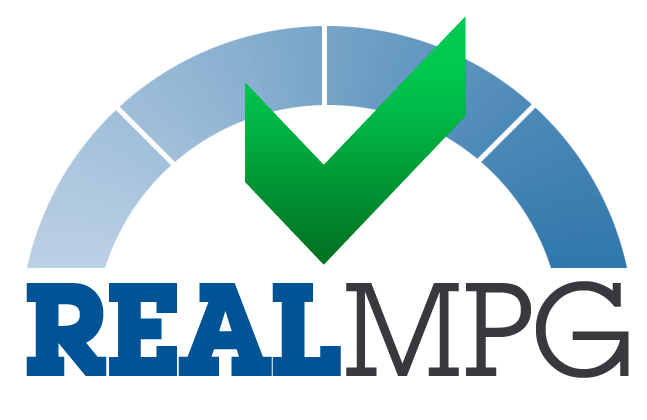
Real MPG was created following thousands of readers telling us that their cars could not match the official figures.
Real MPG gives real world data from drivers like you to show how much fuel a vehicle really uses.
Average performance
137%
Real MPG
26–62 mpg
MPGs submitted
150
BMW 3 Series interior
- Boot space is 375–480 litres
- Euro NCAP rating of five stars
| Dimensions | |
|---|---|
| Length | 4633–4713 mm |
| Width | 2031–2068 mm |
| Height | 1429–1445 mm |
| Wheelbase | 2850 mm |
BMW 3 Series 2025: Practicality
The BMW 3 Series has a boot big enough for a set of golf clubs, which means it'll be practical enough for most buyers. You'll easily be able to get a couple of overnight bags or the weekly shop in there but, if you're planning on squeezing in a pushchair, you might want to look at the BMW 3 Series Touring instead.
Boot aside, the BMW 3 Series is pretty spacious as far as mid-size executive cars go. Even the tallest of drivers should be able to get comfortable in the front, while even the rear seats don't feel particularly claustrophobic for adults. If you're regularly carrying rear-seat passengers, they might be happier in the massive Skoda Superb. That said, there are Isofix points on the outer rear seats - allowing easy fitting of child seats.
BMW 3 Series 2025: Quality and finish
Take a seat inside the BMW 3 Series and it'll soon become clear where your money goes. It feels impeccably high quality, with lots of soft-touch materials and well-damped buttons.
The BMW 3 Series Sport comes with Sensatec upholstery rather than conventional leather but that's not necessarily a bad thing - it looks and feels a lot like 'proper' leather, plus it's vegan friendly. The same can't be said for the standard leather steering wheel.
Upgrade to the M Sport and you get part Alcantara and Sensatec seats with blue stitching. Genuine leather is available as an optional extra on the M Sport - desirable in a car like the 3 Series, we reckon.
BMW 3 Series 2025: Infotainment
The infotainment offering in the BMW 3 Series has evolved over time. Find a basic example of an earlier model and you'll get an 8.8-inch media system. M Sport models, meanwhile, got a 10.25-inch display which was rolled out across the range towards the end of 2020.
For the ultimate in infotainment, though, you'll need one of the latest facelifted BMW 3 Series models (introduced late in 2022). These get the same curved dual-screen display as the new BMW iX and i4, pairing a 12.3-inch digital instrument cluster with a 14.9-inch central infotainment screen.
We've long been fans of BMW's infotainment offerings, mainly because - with a bit of practice - they become very user-friendly. You still get physical buttons for important things like adjusting the temperature of the climate control, for example. And there's a rotary controller positioned between the front seats - meaning you don't have to lean forwards and get your fingerprints on the touchscreen display.
Both displays have sharp graphics and fast responses, while all the menus are sensibly laid out making them easy to navigate. You get Apple CarPlay and Android Auto as standard now, too - something that couldn't be said when this BMW 3 Series first went on sale in 2019.
BMW 3 Series value for money
BMW 3 Series 2025: Prices
Prices start from around £37,000 for a BMW 320i in Sport trim, while the BMW 320d is a fraction under £40,000. You'll pay upwards of £40,000 for a BMW 330i and nearly £43,000 for a BMW 330e.
The most desirable BMW M340d and BMW M340i command a premium - both are nudging £53,000.
The BMW 3 Series generally holds its value well but, if you're happy to consider a used or nearly-new model, there is cash to be saved. A budget of £25,000 will get you a two-year-old BMW 320i or 320d SE, while M Sport models attract a small premium. Just £40,000 will get you an M340i or M340d on the used market - a healthy saving off list price.
BMW 3 Series 2025: Running Costs
In terms of fuel economy, the BMW 3 Series needn't cost a great deal to run. Don't buy solely on MPG figures, though - it's worth doing some research and buying the right ones for your needs.
The petrol models are pretty good all-rounders, capable of up to 44.1mpg in 320i form. This'll drop slightly in reality, but our Real MPG data can give you an idea of what to expect in reality. The BMW 330i is likely to be a bit thirstier (exact figures are yet to be confirmed), while you'll need deeper pockets to run a BMW M340i (officially it'll return up to 35.3mpg).
If you cover a lot of journeys around town, you might want to look at the BMW 330e plug-in hybrid. Like all PHEVs, this needs regular charging to get the best from it but - with a full top up - it should be able to travel around 25 miles or so (in the real world) under electric power alone. Once the battery's depleted, the 330e has a 2.0-litre petrol on hand for those longer journeys.
High-mileage drivers would be better looking at a diesel BMW 3 Series, particularly if you spent a lot of time out of town or on motorways. The BMW 320d is the efficiency champion of the range, capable of up to 58.9mpg according to official WLTP fuel economy tests. Opting for an xDrive all-wheel-drive model sees this drop to 54.3mpg, but even the high-performance BMW M340d is capable of up to 47.1mpg.
Fuel costs aside, you might find a BMW 3 Series a little more expensive to run than, say, a Skoda Superb. That's especially true if you stick to main dealer servicing, while VED (road tax) is likely to be a bit more expensive than you might like. As most BMW 3 Series models have a list price (when new) of more than £40,000, they're stung by the government's premium car surcharge. As a result, you'll pay £520/year for fives years (from the second time the car's taxed). After that, tax drops to £165 a year. Hybrid models (including mild hybrids and plug-in hybrids) qualify for a £10/year discount.
Satisfaction Index
 What is your car like to live with?
What is your car like to live with?
We need your help with our latest Satisfaction Index, so that we can help others make a smarter car buying decision. What's it like to live with your car? Love it? Loath it? We want to know. Let us know about your car - it will only take a few minutes and you could be helping thousands of others.
Help us with the Honest John Satisfaction Index nowBMW 3 Series models and specs
As of the 2022 update, standard specification for all BMW 3 Series models now includes 17-inch light-alloy wheels. The M Sport model includes 18-inch light-alloy wheels as standard, while the BMW Performance models produced feature a 19-inch light-alloy design. The range of exterior colours has been expanded to include Skyscraper Grey metallic and Brooklyn Grey metallic for M Sport models. The BMW Individual Frozen Pure Grey metallic and Frozen Tanzanite Blue metallic special paint finishes have also been added to the range.
Chrome accents highlight the double bars on the BMW kidney grille on M Sport models, with a large central air intake that features hexagonal contours and a honeycomb pattern. Deeply recessed air curtains at the outer edges of the front end accentuate its width. On the M-specific rear apron, vertical reflectors at the outer edges and a large diffuser signal the car’s sporting instincts. M Sport models feature M Sport suspension (except plug-in hybrid variants) including variable sport steering (except plug-in hybrid variants) and newly designed 18-inch M light-alloy wheels with mixed tyres. The M Sport trim also includes bespoke interior touches, such as an anthracite-coloured headliner, M leather steering wheel, M-specific upholstery and interior trim finishers in the new Aluminium Rhombicle Anthracite finish.
The M Sport Pro Pack has had some enhancements. Available only on M Sport models, this package includes now includes sprint mode as well as extended M High-gloss Shadowline trim that brings a Black kidney grille surround and tailpipes in Black Chrome, as well as M lights Shadowline, an M Sport braking system with red callipers bearing the M logo, a black M rear spoiler for the Saloon models, and seat belts with contrast stitching in the colours of BMW M.
M-specific exterior features such as large air intakes and aerodynamically optimised details make the BMW Performance models in the new BMW 3 Series range even more dynamic. The BMW M340i xDrive and BMW M340d xDrive feature a mesh-design BMW kidney grille, exclusive 19-inch M light-alloy wheels, trapezoidal exhaust tailpipes and new M exterior mirror caps in Black high-gloss. The Saloon versions also feature a Black Sapphire M rear spoiler. Adaptive LED Headlights with blue accents also come as standard on both models.
| Dimensions | |
|---|---|
| Length | 4633–4713 mm |
| Width | 2031–2068 mm |
| Height | 1429–1445 mm |
| Wheelbase | 2850 mm |
| Miscellaneous | |
|---|---|
| Kerb Weight | 1445–1875 kg |
| Boot Space | 375–480 L |
| Warranty | 3 years / Unlimited miles |
| Servicing | 10000–18000 miles |
| Costs | |
|---|---|
| List Price | £42,885–£57,840 |
| Insurance Groups | 24–42 |
| Road Tax Bands | A–I |
| Official MPG | 47.9–67.3 mpg |
| Euro NCAP Safety Ratings | |
|---|---|
| Adult | - |
| Child | - |
| Pedestrian | - |
| Overall | 5 |
Currently on sale
| Saloon | |||
|---|---|---|---|
| Version | List Price | MPG | 0-62 |
| 320 M Sport 320d 190 48v MHEV Auto Start/Stop 4dr | £42,885 | - | 6.8 s |
| 320 M Sport 320i Auto Start/Stop 4dr | - | - | 7.4 s |
| 320 Sport 320d 190 48v MHEV Auto Start/Stop 4dr | £42,935 | - | 6.9 s |
| 320 Sport 320i Auto Start/Stop 4dr | - | - | 7.4 s |
| M340 xDrive M340d xDrive 48v MHEV Auto Start/Stop 4dr | £57,840 | - | 4.6 s |
| M340 xDrive M340i xDrive 48v MHEV Auto Start/Stop 4dr | £56,995 | - | 4.4 s |
On sale until February 2024
| Saloon | |||
|---|---|---|---|
| Version | List Price | MPG | 0-62 |
| 320 xDrive M Sport 320d xDrive 190 48v MHEV Auto Start/Stop 4dr | - | - | 7.2 s |
| 320 xDrive M Sport 320i xDrive Auto Start/Stop 4dr | - | - | 7.7 s |
| 320 xDrive Sport 320d xDrive 190 48v MHEV Auto Start/Stop 4dr | - | - | 7.2 s |
| 320 xDrive Sport 320i xDrive Auto Start/Stop 4dr | - | - | 7.7 s |
| 330 M Sport 330i Auto Start/Stop 4dr | - | - | 5.9 s |
| 330 Sport 330i Auto Start/Stop 4dr | - | - | 5.9 s |
On sale until August 2022
On sale until June 2021
| Saloon | |||
|---|---|---|---|
| Version | List Price | MPG | 0-62 |
| 318 SE 318d 150 48v Auto MHEV Start/Stop 4dr | - | - | 8.4 s |
| 318 Sport 318d 150 48v Auto MHEV Start/Stop 4dr | - | - | 8.4 s |
| 318d 2.0 SE 4dr | - | - | - |
| 318d 2.0 Sport 4dr | - | - | - |
| 318i 2.0 SE Auto 4dr | - | - | 8.4 s |
| 318i 2.0 Sport Auto 4dr | - | - | 8.4 s |
| 320d 2.0 48V Mht SE Auto 4dr | - | - | 6.8 s |
| 320d 2.0 48V Mht Sport Auto 4dr | - | - | 6.8 s |
| 320d 2.0 48V Mht xDrive SE Auto 4dr | - | - | 6.8 s |
| 320d 2.0 48V Mht xDrive Sport Auto 4dr | - | - | 6.8 s |
| 320i 2.0 SE Auto 4dr | - | - | - |
| 320i 2.0 Sport Auto 4dr | - | - | - |
| 320i 2.0 xDrive SE Auto 4dr | - | - | - |
| 320i 2.0 xDrive Sport Auto 4dr | - | - | - |
| 330 Sport 330d 48v MHEV Auto Start/Stop 4dr | - | - | 5.5 s |
| 330 xDrive Sport 330d xDrive 48v MHEV Auto Start/Stop 4dr | - | - | 5.1 s |
| 330i 2.0 Sport Auto 4dr | - | 47.9 mpg | 5.8 s |
On sale until December 2020
| Saloon | |||
|---|---|---|---|
| Version | List Price | MPG | 0-62 |
| 330 M Sport Pro Edition 330d Auto Start/Stop 4dr | - | - | - |
| 330 xDrive M Sport Pro Edition 330d xDrive Auto Start/Stop 4dr | - | - | - |
| 330d 3.0 M Sport Auto 4dr | - | - | - |
| 330d 3.0 Sport Auto 4dr | - | - | - |
| 330d 3.0 xDrive M Sport Auto 4dr | - | - | - |
| 330d 3.0 xDrive Sport Auto 4dr | - | - | - |
| M340i 3.0 xDrive Auto 4dr | - | - | - |
On sale until November 2020
| Saloon | |||
|---|---|---|---|
| Version | List Price | MPG | 0-62 |
| 320d 2.0 48V Mht M Sport Plus Edition Auto 4dr | - | - | 6.8 s |
| 320d 2.0 Mht xDrive M Sport Plus Edition Auto 4dr | - | - | 6.8 s |
| 320i 2.0 M Sport Plus Edition Auto 4dr | - | - | - |
| 320i 2.0 xDrive M Sport Plus Edition Auto 4dr | - | - | - |
| 330d 3.0 M Sport Tech/Plus Pack Auto 4dr | - | - | - |
| 330d 3.0 xDrive M Sport Tech/Plus Pck Auto 4dr | - | - | - |
| 330e 2.0 M Sport Plus Edition Auto 4dr | - | - | - |
| 330i 2.0 M Sport Plus Edition Auto 4dr | - | - | - |
On sale until October 2020
| Saloon | |||
|---|---|---|---|
| Version | List Price | MPG | 0-62 |
| 318d 2.0 M Sport Auto 4dr | - | - | - |
| 318d 2.0 SE Auto 4dr | - | - | - |
| 318d 2.0 Sport Auto 4dr | - | - | - |
On sale until June 2020
| Saloon | |||
|---|---|---|---|
| Version | List Price | MPG | 0-62 |
| 320d 2.0 M Sport 4dr | - | 62.8 mpg | 7.1 s |
| 320d 2.0 M Sport Auto 4dr | - | 65.7 mpg | 6.8 s |
| 320d 2.0 SE 4dr | - | 64.2 mpg | 7.1 s |
| 320d 2.0 SE Auto 4dr | - | 67.3 mpg | 6.8 s |
| 320d 2.0 Sport 4dr | - | 62.8 mpg | 7.1 s |
| 320d 2.0 Sport Auto 4dr | - | 65.7 mpg | 6.8 s |
| 320d 2.0 xDrive M Sport Auto 4dr | - | 61.4 mpg | 6.9 s |
| 320d 2.0 xDrive SE Auto 4dr | - | 62.8 mpg | 6.9 s |
| 320d 2.0 xDrive Sport Auto 4dr | - | 61.4 mpg | 6.9 s |
Model History
- October 2018: BMW 3 Series launched
- November 2018: 3 Series 330e plug-in hybrid announced
- October 2019: BMW 340i xDrive announced
- February 2020: BMW expands 330e range
- May 2022: Revised BMW 3 Series range priced from £36,670
- May 2024: Fresh round of updates for BMW 3 Series, prices start from £39,045
October 2018
BMW 3 Series launched
The upgraded four-cylinder engines from the BMW Group’s Efficient Dynamics family are used in the BMW 330i and the BMW 320d. The 3 Series Saloon will feature a new- generation six-speed manual gearbox and the eight-speed Steptronic transmission. As an alternative to rear-wheel drive, the BMW xDrive all-wheel-drive system will also be available for the new BMW 320d at launch.
The 3 Series is 85mm longer than its predecessor (at 4709mm), 16mm wider (1827mm) and just 1mm taller (1442 millimetres). Added to that, its wheelbase has been extended by 41mm to 2,=851mm, as has its track widths (front: by 43mm, and rear by 21mm).
From launch, customers can choose from two non-metallic colours and ten metallic shades including the brand new Portimao Blue metallic which is unique to the top-selling M Sport model.
The newly-designed instrument cluster and Control Display form a large surfaced screen grouping, while the controls not included in these units are arranged into clearly structured function panels.
Displays and buttons for the air conditioning are at the centre of the instrument panel while the light functions are operated via a panel of buttons next to the steering wheel. The start/stop button for the engine is now positioned in a control panel in the centre console that houses the gearshift lever or newly designed selector lever, the iDrive Controller, electromechanical parking brake and the buttons for the Driving Experience Control switch unit.
The entry level SE model features substantially increased standard specification. It includes Extended LED headlights with cornering light and eyebrow indicators, BMW Light Carpet, interior Ambient Lighting with up to 11 colour settings, reversing camera and latest generation reversing assistant, electric folding rear view mirrors, three-zone air conditioning and enhanced acoustic glazing.
All 3 Series models get 40:20:40 split folding rear seats and folding rear headrests as standard. The entry model features a leather Sport steering wheel and BMW Live Cockpit plus, with its 8.8-inch central instrument cluster.
The SE models get line-specific front and rear bumper design, and they also come with exclusive 17-inchlight-alloy wheels or optional 18-inch wheels, bespoke door sill strips and LED front foglights.
The Sport model adds exterior features including BMW Individual high-gloss Shadow Line trim for the side window surrounds, plus kidney grille bars and trim elements for the air intakes and rear apron in High-gloss Black. The Sport model’s interior features trim strips in High-gloss Black and sports seats for the driver and front passenger. The Sport model now comes equipped with 18-inch alloy wheels, Vernasca leather seats and also driver and passenger heated seats.
The M Sport model features particularly large air intakes as well as a different design for the front bumper, side skirts and rear apron. It also includes BMW Individual high-gloss Shadow Line trim, kidney grille bars in High-gloss Black, air intake trim in High-gloss Black and a rear diffuser in Dark Shadow. Inside there are Sports seats, an M leather steering wheel, an anthracite-coloured BMW Individual headliner and interior trim strips in Aluminium Tetragon, updated Vernasca leather seat trims and heated front seats. The M Sport model will also feature as standard the new BMW Live Cockpit Professional with a 12.3-inch digital instrument cluster, 10.3-inch central instrument cluster and BMWs brand new ID7 operating system.
Upgrades have been made to the BMW TwinPower Turbo technology for the two-litre, four-cylinder diesel engines in the BMW 320d and BMW 320d xDrive models. The revised diesel has a maximum output of 190hp and a peak torque of 400Nm enabling the BMW 320d to accelerate from zero to 62 mph in 7.1 seconds (automatic: 6.8 seconds) while the BMW 320d xDrive can get from zero to 62mph in 6.9 seconds.
Claimed average fuel consumption is 64.2mpg (automatic: 67.3mpg) for the 320d and 62.8mpg for the 320d xDrive. The 320d’s CO2 emissions are 115g/km (automatic: 110 g/km) while the 320d xDrive’s CO2 emissions are 118g/km.
|
Model |
Power output (hp) |
Peak Torque (NM) |
Acceleration |
Top Speed (mph) |
Fuel consumption combined (mpg) |
CO 2 |
Price from |
|
BMW 320d |
190 |
400 |
7.1 (6.8) |
149 |
64.2 (67.3) |
115 (110) |
£33,610 |
|
BMW 320d xDrive |
190 |
400 |
(6.9) |
(145) |
(62.8) |
(118) |
£36,800 |
|
BMW 330i |
258 |
400 |
(5.8) |
(155)* |
(48.7) |
(132) |
£37,660 |
Both the BMW 320d and BMW 320d xDrive SE models are equipped as standard with 17-inch light-alloy wheels while the Sport and M Sport models feature unique 18-inch wheel designs and optional 19-inch light-alloy wheels are available - as are high performance tyres.
The 320d and 320d xDrive can be specified, as part of the M Sport Plus package with uprated M Sport brakes. These lightweight model-specific brake discs have a grey cast iron friction ring with an aluminium brake disc chamber, while the blue-painted callipers feature the M logo. The M Sport brakes are included within all 330i M Sport models.
The new 3 Series Saloon also includes Dynamic Stability Control (DSC) which features anti-lock braking (ABS) and Dynamic Traction Control (DTC), but also a variety of stabilising functions and the Start-Off Assistant. The Performance Control function is also standard. This system improves agility by varying the drive torque through the rear wheels depending on conditions.
The M Sport differential for the rear axle is available as an option for the BMW 330i and BMW 330d models in combination with the M Sport Plus package.The electronically controlled, fully variable locking function in the rear differential helps to enhance traction, agility and cornering.
Boot capacity is 480 litres, and its new partitioning into primary luggage compartment and separate storage compartments has created an additional 36 litres of space. Automatic Tailgate operation and an electrically retractable towbar are also optional.
Professional radio comes as standard on the BMW 3 Series Saloon. It features six speakers with an output of 100 watts. The optional 464-watt Harman Kardon surround sound system with 16 speakers and a digital seven-channel amplifier is available as part of the Technology package.
The package and option structure for the new 3 Series has been dramatically simplified, with a package and option list reduced to 6 main packages and around 10 single options. The packages group together options which share similar functionality or customer benefit, and will ease the ordering process while still allowing for a wide degree of personalisation.
The M Sport Plus package combines a 19-inch wheel, M Sport brakes (20d and 20d xDrive) Adaptive M Suspension, Sun Protection Glazing, M Seat belts, Black kidney grills, M Rear spoiler. The 30i models with M Sport Plus also gain the electronic M differential.
A new Technology package combines the Harman Kardon speakers, Head Up Display, Extended Bluetooth with Wireless Charging and Gesture Control. The Comfort package combines the Heated Steering Wheel, Comfort Access, Automated Tailgate and Storage Compartment package. The Premium package includes Electric Seats with memory, Lumbar Support and the Electric Glass Sunroof.
The BMW 3 Series is on sale from 9 March 2019 with OTR prices starting from £33,610.
November 2018
3 Series 330e plug-in hybrid announced
Due to be launched in summer 2019 and 30 per cent faster than its predecessor, delivering a 50 per cent increase in electric-only range to go with a reduction in CO2 emissions of more than 10 per cent. A major new addition to the new 330e is the standard-fit XtraBoost – an on-demand performance system that increases power output of the plug-in hybrid drive from 252hp by 41hp at the touch of a button. As well as the extra power, the updated plug-in hybrid can cover a distance of up to 37 miles using electric power alone while average combined fuel consumption is now 138mpg and CO2 emissions are 39g/km.
The plug-in hybrid drivetrain comprises a 184hp 2.0-litre four-cylinder petrol engine with BMW TwinPower Turbo Technology aligned to an electric motor that generates a continuous output of 68hp and a peak output of 113hp. Together, the two drive units develop a total output of 252hp along with a peak torque of 420Nm, but extra power can be sourced when selecting the SPORT driving mode. This activates the XtraBoost system that draws on power stored in the high voltage battery. This offers the kind of performance and driving dynamics that are typical of the BMW 3 Series Saloon. For the first time in a BMW hybrid model, this includes an accelerator pedal curve that offers exceptional response and precision, along with a specific shifting programme for the eight-speed Steptronic transmission complete with brake downshifts. The XtraBoost can be used up to the minimum charge status of the high voltage battery and is also available for kickdown manoeuvres and in the M/S position of the gear selector lever.
Thanks to all this state-of-the-art technology, the new BMW 330e Saloon can accelerate from zero to 62mph in 6.0 seconds and can go on to a top speed of 143mph. It can travel up to 68mph when running on electric power alone – 18mph faster than the predecessor model.
|
|
Peak Power (hp) |
Peak Torque (Nm) |
Peak Power with XtraBoost (hp) |
Acceleration (0-62mph) |
Top Speed (mph) |
CO2 emissions (g/km)* |
Average Combined Fuel Economy* (mpg) |
Electric-only range (miles) |
|
BMW 330e |
252 |
420 |
293 |
6.0 |
143 |
39 |
138 |
37 |
In order to save space, the BMW 330e’s electric motor is integrated into the eight-speed Steptronic transmission. This means the hybrid-specific transmission is only 15mm longer than the corresponding versions for conventionally powered BMW 3 Series saloons.
The BMW 330e also offers a model-specific sound design to deliver a suitably throaty engine noise when the car is put through its paces. The hybrid-specific optional equipment features also include an acoustic pedestrian protection function, so that those about to cross the road can hear the car approaching when it is in electric-only mode.
The BMW 330e also features regenerative braking in order to optimise efficiency. The system stores the energy captured during braking with the electric motor taking on the function of a generator. The electrical energy fed into the high-voltage battery in this way or via connection to the power grid also serves to supply the vehicle electrical system. This means that a generator powered by the combustion engine is no longer necessary, increasing overall efficiency. The 12.0kWh lithium-ion high-voltage battery in the G20 BMW 330e Saloon is positioned underneath the rear seats, while the fuel tank is located above the rear axle to ensure optimal luggage capacity. The total storage volume is 375 litres but can be increased by folding down the rear-seat backrests which are configured in a 40:20:40 split.
Virtually the entire range of optional equipment features for the G20 BMW 3 Series Saloon is available for the plug-in hybrid. As alternatives to the basic model, the new BMW 330e offers SE, Sport Line and M Sport versions. It can also be fitted with the Adaptive M suspension including Variable Sports Steering and the M sports brake system.
The full range of driver assistance systems to optimise comfort and safety are also available – ranging from the Park Assistant including reverse assistant, which is standard on all 330e models, to the optional Driving Assistant Professional with steering and lane guidance system. Preheating and pre-conditioning of the interior is standard on all models. Here the energy of the high-voltage battery is also used to power the auxiliary heating. At low outdoor temperatures, the interior can be heated prior to setting off even if the battery charge status is low.
From launch, new digital services will be on offer to make it more attractive and convenient to charge the battery while out and about. When selecting a public charging station, the navigation system also provides the driver with a list of recommended nearby hotels, restaurants, cafés, tourist attractions and cultural institutions, the driver receives the information along with a forecast of the occupancy status of the public charging station at the time of arrival.
The BMW 330e is on sale from July 2019.
October 2019
BMW 340i xDrive announced
From November 2019, the BMW M340i xDrive Saloon and Touring models will be available in First Edition guise. Limited to 340 units in each case, the First Edition will include particularly enticing design and equipment features.
A 374PS 3.0-litre straight-six petrol engine takes the BMW M340i xDrive Saloon from 0 to 62 mph in 4.4 seconds, the new BMW M340i xDrive Touring in 4.5 seconds. This makes both models half a second quicker than the range-topping variants of the outgoing 3 Series.
Power is up 48PS compared to the engine powering the previous range-topping models, while peak torque is up 50Nm to 500Nm. An M Sport exhaust system is fitted as standard, featuring a flap which opens to provide more noise in Sport or Sport+ mode.
The new straight-six engine teams up as standard with the latest-generation eight-speed Steptronic Sport transmission. Intelligent all-wheel-drive is also standard, as is an M Sport differential. Electronically controlled dampers are optional.
The new BMW M340i xDrive Saloon and BMW M340i xDrive Touring ride as standard on bespoke 18-inch M light-alloy wheels shod with mixed-size tyres measuring 225/45 R 18 at the front and 255/40 R 18 at the rear. Likewise model-specific 19-inch M light-alloy wheels in three designs can be found on the options list along with 19-inch BMW Individual light-alloy wheels, again with mixed-size tyres.
M-specific design features include the front apron, side skirts and rear end that have all been crafted to optimise supply of cooling air and the cars’ aerodynamic properties. The bespoke design elements also include the mesh-design BMW kidney grille and trapezoidal exhaust tailpipes. The new BMW M340i xDrive Saloon also sports a body-coloured M rear spoiler. BMW Individual High-gloss Shadowline trim and the Cerium Grey metallic finish for the exterior mirror caps, the air intake trim in the front bumper, the surface of the BMW kidney grille mesh and its surround, the tailpipes and the model badge all add to the exclusive look.
M-specific design and equipment features inside include sports seats for the driver and front passenger upholstered in an M-specific combination of Sensatec and Alcantara with contrast quilting in Blue, an M leather steering wheel with multifunction buttons and shift paddles, a BMW Individual headliner in Anthracite, M pedals, M-specific floor mats and interior trim strips in Aluminium Tetragon with accent strips in Pearl-effect Chrome. ‘M340i’ lettering appears in the digital instrument cluster and also adorns the front door sill plates.
As well as their bespoke powertrain and chassis technology and model-specific exterior and interior design features, the new BMW M340i xDrive Saloon and BMW M340i xDrive Touring are also equipped as standard with three-zone automatic climate control (including separate control of the temperature and ventilation settings both for the driver and front passenger side and the rear passenger compartment), ambient lighting, extended storage and an automatically dimming rear-view mirror. Other items on the standard equipment roster for the high-performance siblings include Park Distance Control with sensors at the front and rear, BMW Live Cockpit Plus complete with navigation system and an 8.8-inch Control Display, and the Connected Package Plus including Real Time Traffic Information, Remote Services, Concierge Services and Apple CarPlay preparation.
February 2020
BMW expands 330e range
BMW has expanded its 3 Series plug-in hybrid range by offering an estate version of the 330e, as well as xDrive four-wheel-drive models.
Available from summer 2020, the BMW 330e combines a 2.0-litre petrol engine with an electric motor, travelling up to 36 miles under electric power.
Officially, the 330e saloon returns between 176 and 201mpg and emits 32-37g/km CO2, while the Touring returns fuel consumption from 176mpg and CO2 emissions from 39g/km.
May 2022
Revised BMW 3 Series range priced from £36,670
For the updated BMW 3 Series Saloon and BMW 3 Series Touring, a newly designed cockpit with BMW Curved Display and the latest-generation BMW Operating System 8 bring ground-breaking modernity and digitalisation to the interior. All variants of the new BMW 3 Series now come as standard with an eight-speed Steptronic Sport transmission with gearshift paddles on the steering wheel and a newly designed selector lever.
Offered in a choice of Sport and M Sport specification in the UK, additions to the standard equipment increase the appeal of the new BMW 3 Series, while a restructured optional equipment line-up makes it easier for customers to individualise their car according to their preferences.
The new BMW 3 Series is available with a choice of four petrol engines, including one plug-in hybrid variant, and two diesel engines, both with mild-hybrid technology. At the top of each model line-up sits a pair of BMW Performance models from BMW M GmbH, meaning the new BMW 3 Series can be ordered with outputs from 184hp to 374hp. BMW xDrive intelligent all-wheel drive comes as standard on the range-topping models, and is an option on selected variants.
Production of the new BMW 3 Series Saloon and BMW 3 Series Touring will begin in July 2022 at BMW Group Plant Munich and BMW Group Plant in San Luis Potosi, Mexico. Available to order at BMW Retailers from today, pricing will start from £36,670 RRP.
|
Model (Saloon/Touring) |
Power (hp)* |
Torque (Nm)* |
0-62 mph (s)* |
Top speed (mph)* |
Fuel economy (mpg)* |
CO2 emissions (g/km)* |
Starting Price (RRP) |
|
BMW 320i |
184 |
300 |
7.1/7.5 |
146/143 |
39.2 – 44.1 |
163 – 145 |
£36,670 |
|
BMW 320i xDrive |
184 |
300 |
7.6/- |
143 |
37.2 – 42.2 |
173 – 153 |
£38,220 |
|
BMW 320d |
190 |
400 |
6.8/7.1 |
149/143 |
51.4 – 58.9 |
145 – 127 |
£39,515 |
|
BMW 320d xDrive |
190 |
400 |
6.8/7.4 |
144/140 |
47.9 – 55.4 |
154 – 135 |
£41,065 |
|
BMW 330i |
258 |
400 |
5.9/6.0 |
155/155* |
38.7 – 43.5 |
167 – 148 |
£40,740 |
|
BMW 330e |
292 |
420 |
5.8/- |
143 |
41 – 30 |
156 – 218 |
£42,610 |
|
BMW 330e xDrive |
292 |
420 |
5.8/5.9 |
143/140 |
45 – 33 |
141 – 189 |
£44,160 |
|
BMW M340d xDrive |
340 |
700 |
4.6/4.8 |
155/155** |
44.1 – 48.7 |
169 – 153 |
£52,965 |
|
BMW M340i xDrive |
374 |
500 |
4.4/4.6 |
155/155** |
33.2 – 36.2 |
193 – 177 |
£52,965 |
May 2024
Fresh round of updates for BMW 3 Series, prices start from £39,045
BMW has revealed a fresh set of revisions for its popular 3 Series. Building on the updates introduced to the current model in 2022, the latest revisions include new high-voltage batteries to increase the electric range of the plug-in-hybrid models to a maximum of 63 miles.
There's also new chassis tuning intended to further enhance the balance between sporting agility and comfort. The new 3 Series also comes with BMW Operating System 8.5 used by the upgraded BMW iDrive, including new navigation functions like Augmented View.
New exterior paint finishes and light-alloy wheels are also included as part of the update, as is a newly designed steering wheel and instrument panel.
Prices for the new model start at £39,045 and first deliveries are set for late summer 2024.

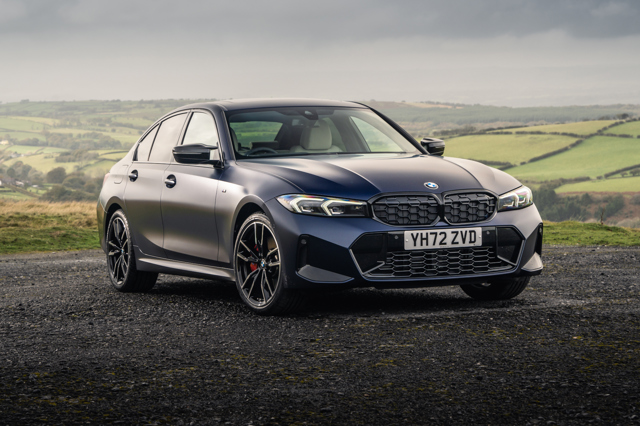
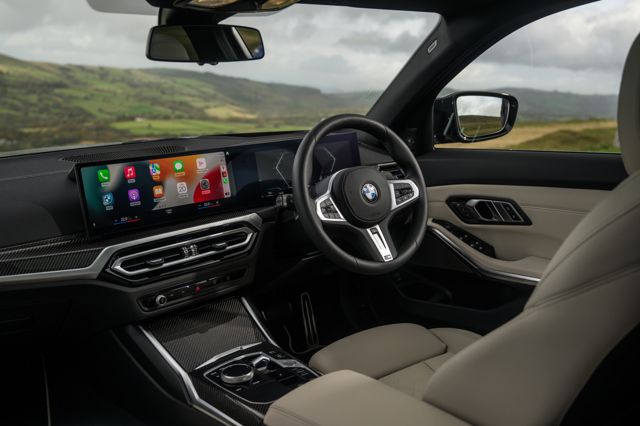
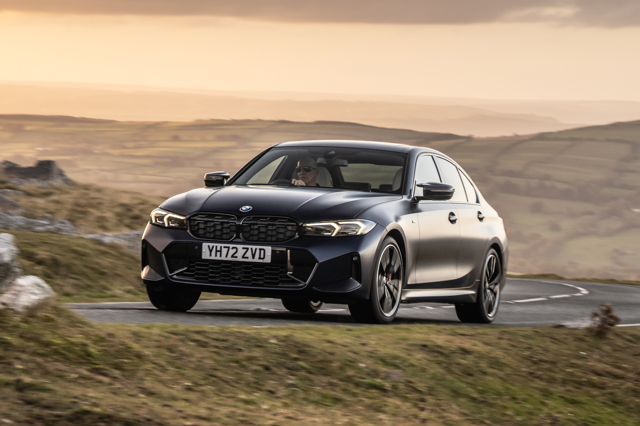
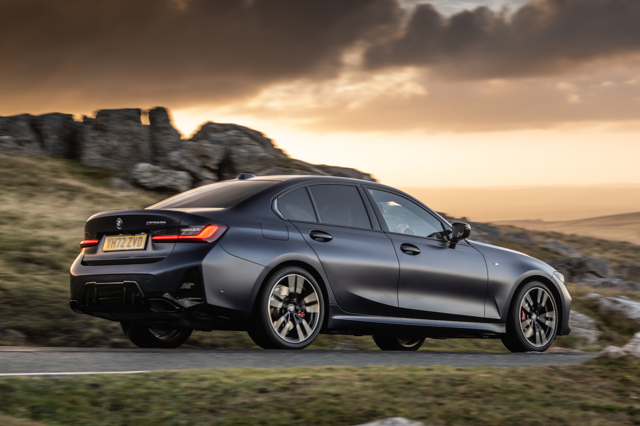
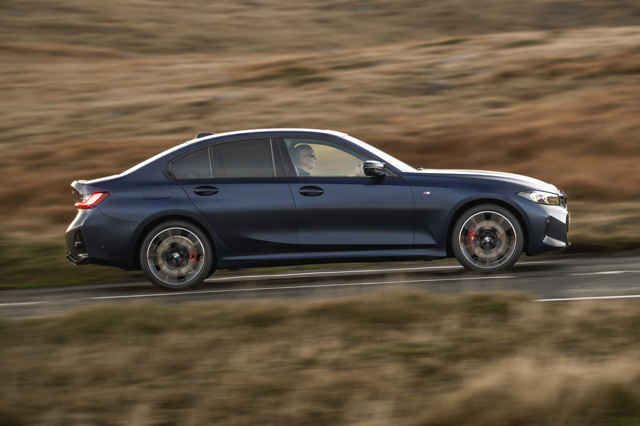
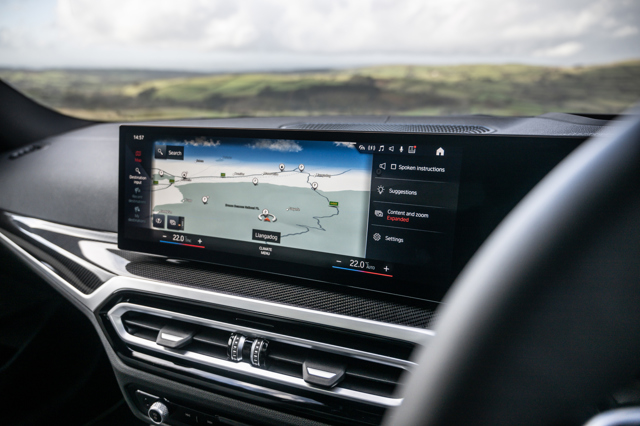
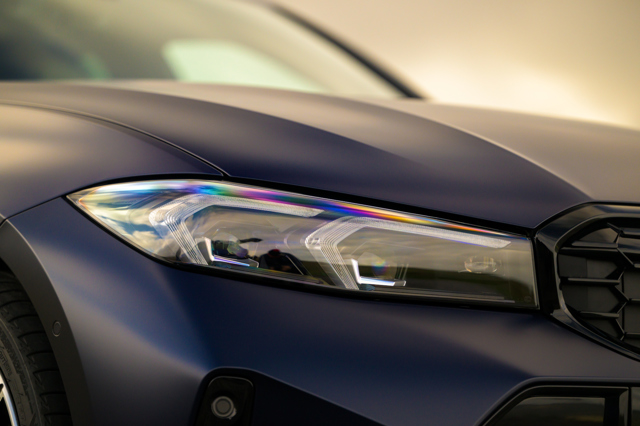


 Great to drive with a wide range of refined engines. Looks and feels very classy. New infotainment from late in 2022 means it's now entirely up-to-date.
Great to drive with a wide range of refined engines. Looks and feels very classy. New infotainment from late in 2022 means it's now entirely up-to-date.
 Even used examples aren't cheap. The Skoda Superb is a bigger, more spacious alternative for less money.
Even used examples aren't cheap. The Skoda Superb is a bigger, more spacious alternative for less money.
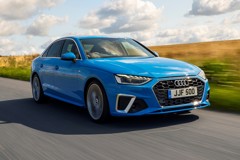

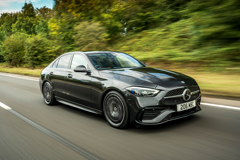
.jpg?width=240&height=160&rmode=crop)

